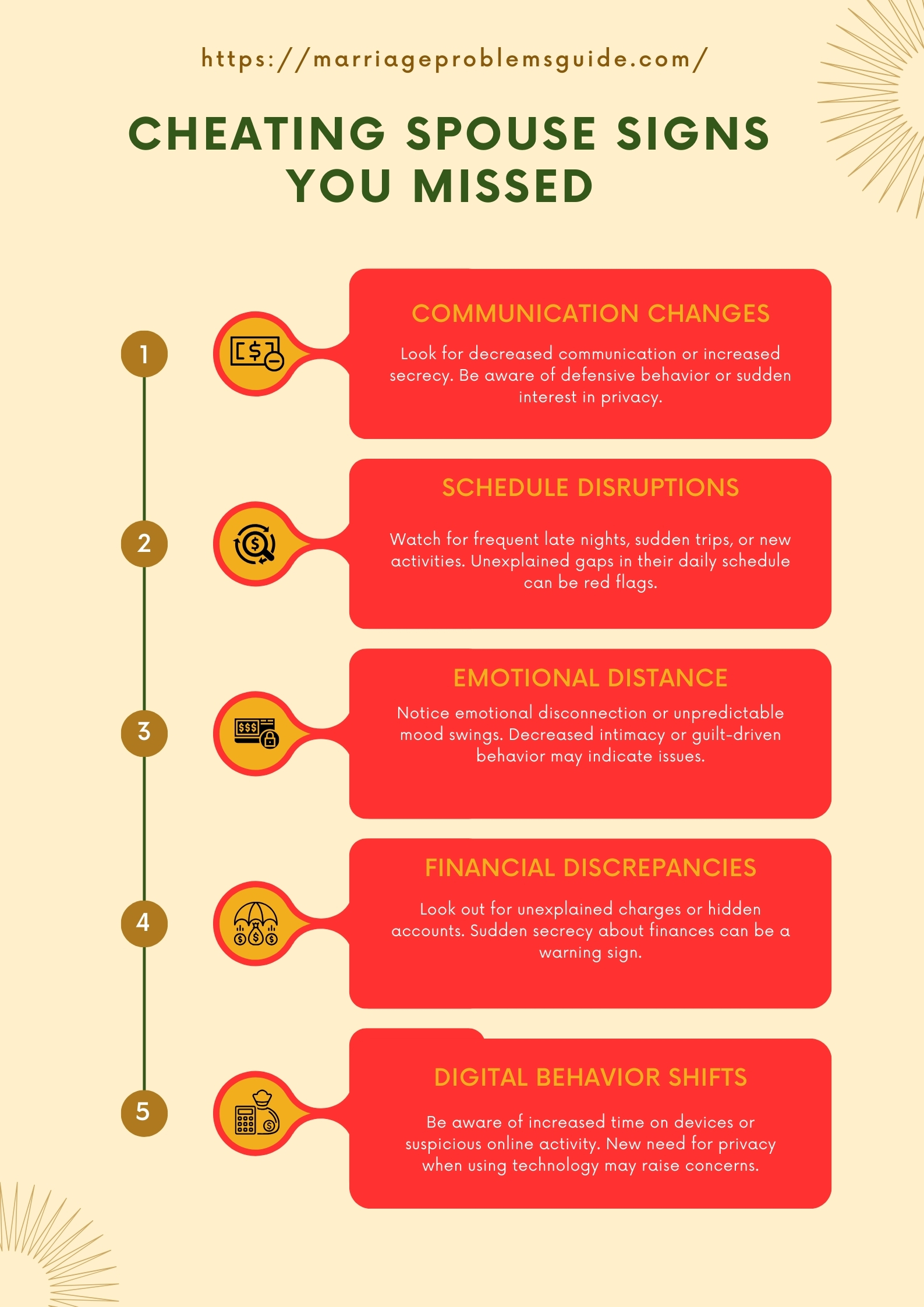Discovering that your spouse may be cheating can be a devastating experience. Often, the signs of infidelity are subtle and easy to overlook, especially when you’re deeply invested in your relationship.
In this will help you recognize the potential red flags of a cheating spouse, providing you with the knowledge to address your concerns and make informed decisions about your relationship.
It’s important to note that while these signs may indicate infidelity, they are not definitive proof. Open communication and trust are crucial in any relationship, and it’s essential to approach this sensitive topic with care and consideration.
Common Signs of a Cheating Spouse
1. Changes in Communication Patterns
One of the first signs that something might be amiss in your relationship is a shift in how your spouse communicates with you. Consider the following:
- Decreased communication: Your partner suddenly becomes less talkative or avoids engaging in meaningful conversations.
- Increased secrecy: They become protective of their phone, computer, or other devices.
- Defensive behavior: When questioned about their activities or whereabouts, they respond with hostility or defensiveness.
- Sudden interest in privacy: They start taking calls in private or insist on having their own password-protected accounts.
2. Unexplained Changes in Schedule or Routine
A cheating spouse often needs to create time and space for their affair. Look out for:
- Frequent late nights at work or sudden business trips
- New hobbies or activities that don’t include you
- Unexplained absences or gaps in their daily schedule
- Changes in their regular routine without a clear reason
3. Shifts in Emotional Connection
Infidelity can cause significant changes in the emotional dynamics of your relationship:
- Emotional distance: Your spouse seems disconnected or uninterested in your life and feelings.
- Mood swings: They exhibit unpredictable changes in mood, especially after receiving calls or messages.
- Lack of intimacy: There’s a noticeable decrease in physical affection or sexual interest.
- Guilt-driven behavior: They may shower you with unexpected gifts or attention out of guilt.
4. Financial Discrepancies
Cheating often involves hidden expenses. Be aware of:
- Unexplained charges on credit card statements
- Sudden secrecy about financial matters
- Large cash withdrawals without clear explanations
- Discovery of hidden accounts or credit cards
5. Changes in Appearance and Habits
A cheating spouse might make efforts to appear more attractive to their new love interest:
- Sudden interest in fitness or a new diet
- Purchasing new, more attractive clothing
- Paying more attention to grooming and personal hygiene
- Wearing a new fragrance or cologne
6. Technological Red Flags
In the digital age, technology can provide numerous clues:
- Increased time spent on social media or messaging apps
- Suspicious online activity or new accounts
- Regularly clearing browser history or using incognito mode
- Sudden need for privacy when using devices
The Psychology Behind Cheating
Understanding why people cheat can help you recognize the signs more easily. Common reasons include:
- Emotional or physical dissatisfaction in the current relationship
- Low self-esteem or need for validation
- Opportunistic behavior during times of separation
- Revenge or retaliation for past hurts
- Addiction to the thrill of a new relationship
Table: Comparing Typical vs. Suspicious Behavior
| Aspect | Typical Behavior | Suspicious Behavior |
|---|---|---|
| Communication | Open and honest | Secretive and evasive |
| Schedule | Consistent and transparent | Unpredictable with unexplained absences |
| Emotional Connection | Stable and engaged | Distant or fluctuating |
| Finances | Shared and transparent | Hidden expenses and secrecy |
| Technology Use | Normal and open | Protective and secretive |
| Appearance | Consistent habits | Sudden, significant changes |
How to Address Your Suspicions
If you suspect your spouse is cheating, consider the following steps:
- Gather evidence: Document the behaviors or incidents that have raised your suspicions.
- Self-reflect: Evaluate your own role in the relationship and any potential issues.
- Seek support: Confide in a trusted friend or family member for perspective and emotional support.
- Consider professional help: A therapist or counselor can provide guidance and coping strategies.
- Confront your spouse: Choose a calm moment to have an honest, non-confrontational discussion about your concerns.
The Importance of Trust and Communication
While it’s crucial to be aware of potential signs of infidelity, it’s equally important to maintain trust and open communication in your relationship. False accusations can be extremely damaging, so approach the situation with caution and empathy.
Rebuilding After Infidelity
If infidelity has occurred, rebuilding trust is possible but requires commitment from both partners:
- Seek couples therapy to address underlying issues
- Establish clear boundaries and expectations
- Practice open and honest communication
- Be patient with the healing process
- Focus on rebuilding emotional intimacy
Preventing Infidelity in Your Relationship
To strengthen your relationship and reduce the likelihood of infidelity:
- Prioritize quality time together
- Maintain open lines of communication
- Address issues and conflicts as they arise
- Show appreciation and affection regularly
- Cultivate shared interests and goals
Conclusion
Recognizing the signs of a cheating spouse can be challenging, as many indicators can be subtle or have alternative explanations.
It’s essential to approach your concerns with a level head and avoid jumping to conclusions without sufficient evidence. Remember that open communication, trust, and mutual respect are the foundations of a healthy relationship.
If you find yourself grappling with suspicions of infidelity, take the time to carefully evaluate the situation, seek support if needed, and approach the issue with your partner in a constructive manner.
Regardless of the outcome, prioritize your emotional well-being and make decisions that align with your values and long-term happiness.
By staying informed about the potential signs of cheating and maintaining a strong, communicative relationship, you can better navigate the complexities of trust and fidelity in your partnership.








